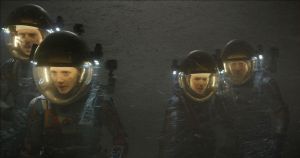
Is this film worth my time? The Martian is the best movie of the moment but it will be forgotten in five years. The hardest thing to do is to not damn a film with faint praise, and The Martian is good, but it’s the bland sibling of Gravity, Interstellar, and Apollo 13.
Who Will Like This Film? Hard science fiction nerds who don’t want their films to have any magic or philosophy or emotion or other wussy things. Just Bear Grylls sciencing the shit out of a wasteland.
Who Won’t Like This Film? The Martian is an extremely lean, Spartan film. Think of Castaway without any emotional development. It almost manages to make surviving on Mars look mundane.
TL,DR: Robinson Crusoe on Mars, sans Friday.

Cinema as Rocket Science: Ridley Scott has made a very professional film, a film that has no fingerprints, so to speak. If you had told me this was a Jon Favreau film, it would have seemed plausible. If you had cast Channing Tatum as the lead instead of Matt Damon, it would have made no difference. Every actor in this movie is competent but nobody is memorable.
The Martian, like Inception, is using science fiction to reflect Hollywood’s image of what it does. There’s the star/astronaut (Matt Damon), and everyone wants to get him home. The producer (Jeff Daniels, playing the NASA director) who has to balance the interests of budget and competing departments to complete the project. There is the film director/ mission director (Chiwetel Ejiofor), who’s trying to figure out the best way to supply the star with what he needs to get home. There’s the Digital Effects House, cinematically represented as the Jet Propulsion Lab, who have to kludge together a workable shot on a tight deadline. There is the writer/astrophysics guy (Daniel Glover), who after much caffeinating manages to imagine a creative plot twist that moves the mission to completion. There’s the marketing/satellite director (Kristen Wiig) whose oversight keeps the director updated on the best things to say to maintain public interest (and funding) in the project. And there’s the spaceship crew, representing the supporting cast (Jessica Chastain/Kate Mara/Michael Pena), for without human interactions, the star has no means of getting off of Mars.
Oh yeah, and there’s also the Chinese/investors (important Chinese stars you’ve never heard of). They save the day by providing resources when the director messes up, in exchange for being portrayed in a loving and positive manner.
There’s no margin for error when engaged in studio film-making, according to The Martian. Everything that isn’t precisely calculated to capture a target audience needs to be jettisoned like so many extra heat shields. One error and you get a flop, and then it’s the cold vacuum of space, where no one can hear your elevator pitch.
The Martian is the denouement of the statistics-driven model of modern studio film-making. Like an In-N-Out hamburger, all the ingredients are quality, but the process is streamlined, and you probably won’t remember The Martian after consuming it anymore than you will remember a good hamburger. It lacks the grit and the tension of Gravity; it lacks the ethereal beauty and wonder of Interstellar; and it lacks the humanity of Apollo 13. What remains is a masterpiece in cinematic economy, and nothing else. The Martian is a perfectly adequate film in every regard, but it is never a transcendent film in any regard.
Taking Apart The Martian like it was the Challenger Shuttle.
The hardest task in critical writing lays not in the outline but in the mean. Our language, and our propensity towards binary thinking in dichotomies, makes it easy to talk about the peaks and the valleys, but not the foot-hills. We have an abundance of superlatives and a deficit of descriptors for those things which are middling.
The second problem in critical writing is parsing the frames of criticism. You’re writing to multiple audiences, and too frequently, you err on the side of the connoisseur or upon the side of the populist. There is the critical frame of the now: I.e., is this film the best option in the category of films now in the theater? There is the critical frame of the genre: I.e., is this film the best space astronaut disaster film? And there is the critical frame of posterity: I.e., is this film on of the best films of this decade.
The Martian is one of the best movies that you can see right now, its in the bottom 10 of the top 10 astronaut disaster films, and it’s a film that will only be a foot-note in the CV’s of the people involved in making it.

Now to the post-launch analysis. Every part of this film is the product of a committee, and no part of this film is the product of an artist, at least of any artist engaged in creativity.
- The script choices- In 2013, 20th Century Fox picked an NYT best-selller Robinsonade sci-fi by Andy Weir. They hired Drew Goddard (Cloverfield, Cabin in the Woods), a former colleague of Joss Whedon, to write the screen-play. Like those films, there’s a light patter of nerd comedy and snark to leaven the violence of the crisis scenes.
- The soundtrack choices. Here is where 20th Century Fox is trying to imitate the success of Disney’s Guardians of the Galaxy, and where we can see the unintended consequence of intellectual property. By the time The Martian decided to raid the musical well of 1970s nostalgia, it had been already picked clean of everything except Abba. That’s right, Abba. The Martian tries to make it into a joke, but having a rocket repair montage set to Waterloo is just torture. Its shamelessly aping Guardians, its shamelessly pandering to baby boomer nostalgia, and the result undercuts any dramatic beauty of Scott’s beautifully composed vistas of Mars. Imagine if the studios had forced Kubrick to splice songs by the Monkees onto his footage of 2001, and you get the idea.
- The casting choices one big inoffensive broadly charismatic a-lister and a whos who of up and comers (Chastain, Glover), and seasoned professional character actors (Sean Bean, Michael Pena).
- The obligatory Chinese pandering. Capitalism has achieved what the Red Army could never do- Hollywood kowtows to the edicts and preferences of the Communist Party of China. Hollywood is no longer making films for Americans- were a secondary market to the market of mainland China. And so, like Black Hat, or like the Avengers: Age of Ultron digression into South Korea, we have a cobbled on sub-plot about how the Chinese space program comes to the rescue of the hapless Americans at NASA, who cant get anything right. Thank you, Glorious Chairman Xi Jinping, for your nations magnanimity! The remake of Red Dawn in 2012 was the harbinger; the Martian signifies the establishment of the new norm.
- Imitation is the sincerest flattery. We have the vertigo inducing zero-G spinning of Gravity. The breath-taking landscape shots of Interstellar. And the ground control grittiness of Apollo 13. And yet, The Martian is less than the sum of its parts. The Martian works like a medley of other, better space crisis movies. You get the highlights, but the clips aren’t foreshadowed,or returned to, and without that recursion of motifs, there isn’t as deep a level of engagement.
But in the end, who cares? The Martian will make a lot of money, and in the words of that modern poet, Taylor Swift, the haters are going to hate hate hate. My criticism will fall on deaf ears, the studios will continue to push the red-line in making the most common denominator space crisis fall movie, and eventually there will be a bust which collapses the space crisis movie fad, just as World War Z (another Drew Goodson project) killed the fast zombie fad.
The Martian isn’t a waste of your time, you won’t hate it, you won’t recall it. Whether it’s a film worth your time is a question of how much you value $11 and 2.5 hours of your existence.

